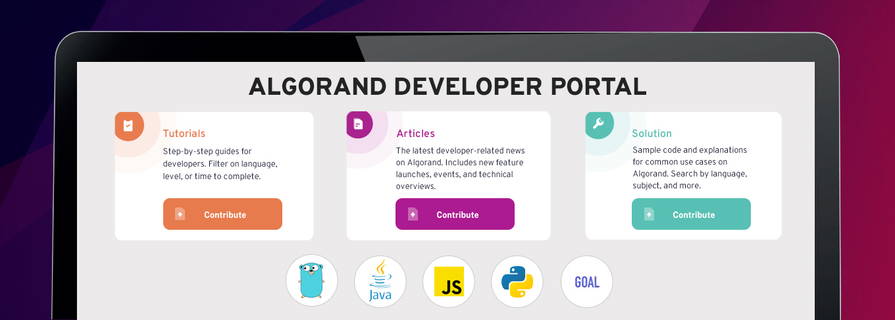fee
Showing 321 posts related with fee.
-
 Beginner · 30 minutes
Beginner · 30 minutesCreating an Algorand Node on Microsoft Azure
In this tutorial we will create an Algorand node on Microsoft Azure.
-
 Beginner · 1 hour +
Beginner · 1 hour +Song Vote on Algorand - Create and deploy a fully functioning Dapp
Create and deploy dApp to vote on songs (or other things) on the Algorand test network. By the end you will have a good understanding of the full development pipeline on Algorand!
-
 Beginner · 1 hour
Beginner · 1 hourWorking with ASA using Java
This tutorial demonstrates the steps involved in creating a basic Algorand Standard Asset using Java.
-
 Beginner · 15 minutes or less
Beginner · 15 minutes or lessExploring the Algorand Sandbox
Explore how the Algorand sandbox works, it's configuration files, interesting artifacts, and how to spin up your custom Algorand network from a genesis file.
-
 Intermediate · 1 hour +
Intermediate · 1 hour +Milestone Dapp Built with Pyteal
We will build a decentralized milestone based application using pyteal and Python. PyTeal is used to write the smart contracts whereas interacting with them is done via Python using the `py-algorand-sdk`.
-
 Intermediate · 30 minutes
Intermediate · 30 minutesLimitOrder Contract with Java
A walkthrough example of how to use a limit order contract with Java.
-
 Intermediate · 30 minutes
Intermediate · 30 minutesLimitOrder Contract with Go
A walkthrough example of how to use a limit order contract with Go.
-
 Intermediate · 30 minutes
Intermediate · 30 minutesHash Time Lock Contract Template With Java
Build a Smart Contract that functions as a HTLC using Java
-
 Beginner · 30 minutes
Beginner · 30 minutesSend an Algorand Transaction Using Rust!
In this tutorial we will take the first steps with the community supported Rust Algorand's SDK. We will start by installing Rust and the Algorand Sandbox and end by sending a transaction in a Rust program.
-
 Beginner · 1 hour
Beginner · 1 hourSimple NPC game interactions using a stateful contract and atomic transfers
This tutorial will show you how to create a simple NPC game character using a stateful contract and atomic transfers. We'll also test it using the `goal` command line tool.
-
 Beginner · 15 minutes or less
Beginner · 15 minutes or lessRestful Algorand API with Spring Boot
By leveraging a simple Algorand Spring Boot starter, and implementing the Spring Web library, we can easily standup a Restful API to allow users to interact with the Algorand ecosystem.
-
 Beginner · 1 hour
Beginner · 1 hourWorking with ASA Using JavaScript
This tutorial demonstrates the steps involved in creating a basic Algorand Standard Asset [(ASA)](https://developer.algorand.org/docs/features/asa/) using [JavaScript SDK](https://github.com/algorand/js-algorand-sdk).
-
 Intermediate · 1 hour
Intermediate · 1 hourIntegrating ALGO and ASA transfers within your application
Learn how to integrate your application with Algo or ASA by walking through code examples.
-

PyTeal — Writing Algorand Smart Contracts in Python
PyTeal is a python language binding for Algorand Smart Contracts (ASC) that abstracts away the complexities in writing smart contracts. PyTeal is provided as an open-source tool for the Algorand community. We invite you to try, use, and contribute to PyTeal if you are interested in developing and deploying ASC’s in Python.
-

Automating with the Mule Framework
Mule is a generalized automation framework for organizing the execution of defined automation in a declarative yaml format.
-

Welcome to the Algorand Developer Portal
The new Algorand Developer Portal provides resources for developers to turn their ideas into full-scale applications. Browse and search across new content, like Tutorials and Solutions. Access technical documentation. Stay up-to-date on the latest features.
-

Updated PyTeal Resources
PyTeal, a language binding for TEAL, is a community project created to make writing Algorand Smart Contracts (ASC) easier. This article summarizes the latest resources available to start building Algorand Smart Contracts in Python.
-

How to Write Smart Contracts
This article summarizes the three primary ways you can build Algorand Smart Contracts.